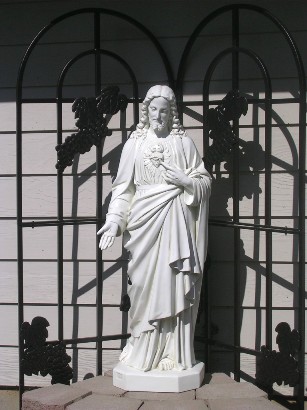Mystery of Human Affliction
(October 25, 2009)
Bottom line: As the Catechism teaches, it often take some affliction to make a person mature, to help him discern what is not essential and to turn to what is. Affliction often provokes a search for God.
In our Scripture readings we see the mystery of human affliction. Why are some deprived of the use of sense - like Bartimaeus, the blind man in today's Gospel? Other lack the use of a limb or experience the failure of a bodily organ. And even though we have remedies for many diseases, new afflictions keep appearing. Why is this? Why do we humans suffer such terrible things?
I obviously do not have the answer to the problem of pain and suffering. It is one of the central questions in the Bible and one of the greatest mysteries of our faith. The Catechism of the Catholic Church has something interesting to say about human illness. I would like to read it to you before discussing this Sunday's Gospel. Here is what the Catechism says:
"Illness can lead to anguish, self-absorption, sometimes even despair and revolt against God. It can also make a person more mature, helping him discern in his life what is not essential so that he can turn toward that which is. Very often illness provokes a search for God and a return to him." (1501)
We can see this in Bartimaeus, the blind man of Jericho. He could have given himself up to self-pity and despair. Instead he heard about Jesus of Nazareth and cried, "Jesus, Son of David, have pity on me." As the Catechism says, "Very often illness provokes a search for God..."
Bartimaeus shows that affliction can help a person discern in his life what is essential and turn to that which is. I have seen that in my weeks here in Peru. Every parish, of course, has many suffering people, but here the suffering is often compounded by poverty. It is especially terrible to see children with afflictions.
I will give one example - a boy named Diego, who has an affliction of his eyes. His family works making bricks and the dust, combined with the direct sunlight (Puno is 16 degrees south of the equator) has damaged his eyes. The nurse in our delegation examined him and said Diego may be in danger of losing his eyesight. With the help of some donations, we took him to an ophthamologist and he has begun a treatment program. I ask your prayers that the damage done to Diego's eyes might be reversed.
Our nurse said that if Diego's problem had been caught earlier, it probably could have been easily treated. Now, his condition has advanced to a point where he could lose his eyesight. Why do such things happen? In Diego's case you can point to external factors: his parents' preoccupation with the basics of survival and the grinding poverty of the area.
But it is not all negative. Diego's affliction elicits compassion and solidarity. And in Diego himself, you can see a faith and maturity beyond his years. Sometimes our children, who have been given every advantage, lack those more important things. Affliction - which comes to every life, no matter what - can awaken us to what truly counts.
Like Bartimaeus in today's Gospel, we need to sense Jesus' approach, cry out to him, have a conversation with the One who can heal us, tell him what we really desire. Perhaps we too will hear those beautiful words, "Go your way. Your faith has saved you."
************
General Intercessions for the Thirtieth Sunday in Ordinary Time, Cycle B (from Priests for Life)
Spanish Version
From Archives (Homily for 30th Sunday, Year B):
2006: Get Yourself in Trouble
2003: Awkward Moments
Other Homilies
Seapadre
Homilies:
Cycle A, Cycle B, Cycle C
Bulletin (St. Mary's Parish)
St. Mary of the Valley Album

(updated September 27, 2009)
Pictures from Peru

(October 2009)
Are these homilies a help to you? Please consider making a donation to St. Mary of the Valley Parish
Home


